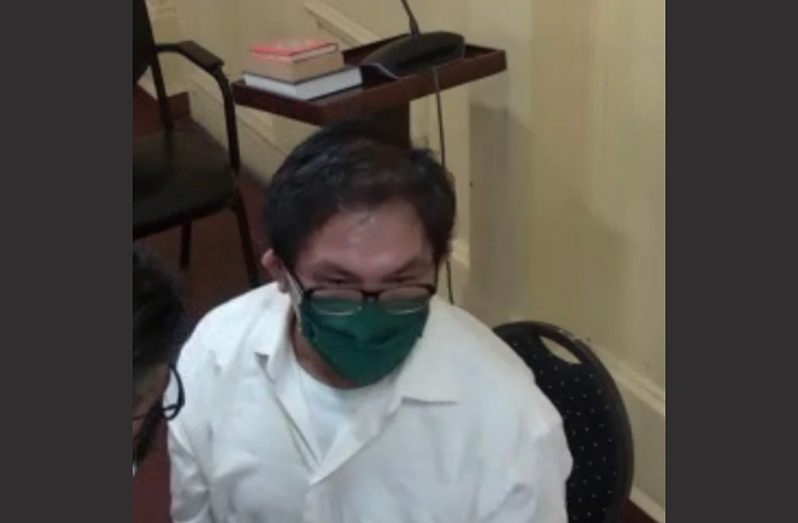-judge says extended incarceration was a ‘grave tragedy’
FIFTY-EIGHT-YEAR-OLD Micobie Village, North Rupununi Savannah resident, Jones Raymond, has been freed of a murder charge which was instituted more than nine years ago.
He had filed legal proceedings over breaches of his constitutional rights caused by the state’s delay in prosecuting him for the crime.
Delivering a judgement against the state on Friday, High Court Judge Sandil Kissoon quashed the longstanding murder indictment against Jones, who was represented by attorney-at-law Teriq Mohammed.
“To no one will we sell, to no one will we deny or delay right or justice”, Justice Kissoon said as he quoted the charter of Magna Carter.
He added that the “unthinkable” occurred against Jones without compassion, conscience and without judicial discretion.
According to the judge, the accused had been an inmate on remand at the Camp Street Prison and other penal institutions for the offence of murder since December 28, 2012, a period of nine years, six months and 18 days.
The judge noted that this period is equivalent to almost 15 prison years. He added that under Article 144 of the Constitution, every citizen is guaranteed a free trial within a reasonable time by an impartial tribunal.
“This is the grave tragedy that has occurred in the circumstances of this accused. The grave injustice that befalls Raymond Jones is not a singular cause of concern for this court. It is the gross dereliction that this accused, voiceless, incommunicado, without the support and unrepresented has been and continues to be subjected to, notwithstanding previous orders and directions made by this court on jail delivery in excess of one year ago,” Justice Kissoon said.
The accused was charged with the murder of Gary Joseph, who was killed on December 26, 2012.
On the day in question, Joseph and several friends were drinking at a shop when the accused asked him about what he had done to his son.
The accused, armed with an arrow and bow, then allegedly shot Joseph. The injured man was rushed to the Mahdia Hospital, from where he was later transferred to the Georgetown Public Hospital. He later succumbed to his injuries.
Jones was committed to stand trial on October 15, 2014, after his preliminary inquiry (PI) was completed in a” timely manner”, that is in less than two years.
The depositions, according to the record of the State, were received by the chambers of the Director of Public Prosecutions (DPP), Shalimar Ali-Hack, on March 23, 2015, one year after the order of committal.
Justice Kissoon said that the matter was remitted by the DPP acting pursuant to Section 77(1) of the Criminal Law Procedure Act, Chapter 10:01 to the magistrate who presided over the PI to “correct what has been described as several material irregularities and omissions on the part of that officer.”
However, the judge said that after examining those directives, it raised the question as to the validity of the committal by the magistrate of the accused.
“Despite the passage of some seven years, that judicial officer has yet to comply with the directives of the DPP, notwithstanding orders made by this court in 2021 whilst this accused continues to languish in prison,” he underscored.
The circumstances of the accused were brought to the court’s attention by the Superintendent of Prisons, initially on jail delivery between 2020 and 2021. Despite the inordinate delay, the matter was not being brought up for trial.
Thereafter, Jones, in an attempt to end his agony, requested to enter a plea of guilty to the lesser count of manslaughter as he was of the view that this was the only path out of prison.
Justice Kissoon gave directions in 2021, that Reymond be taken before the Essequibo Assizes, where the offence had originated, for the presiding judge to take the plea and impose sentence.
However, one year later, the accused appeared in the jail delivery again due to him being unable to have a trial or unable to enter a plea before any court to bring the nightmare and anguish to an end.
“This is in summary, the atrocity and the audacity that confronts this court in relation to the accused before it. By December of 2022, the time spent on remand by this accused will equate to a prison sentence of 15 years based on the specific formula utilised by the Guyana Prison Service on the admission of an inmate in determining the manner and time that an accused spends in custody. They do not utilise a system of 12 months per year, they have a different system,” Justice Kissoon said while delivering his ruling.
He added that this is notwithstanding that the accused has yet to have a valid preliminary inquiry and that the presumption of innocence which he is guaranteed under the Constitution, continues to apply in his favour.
“I’m unable to contemplate how did we in the criminal justice system arrive at this juncture, where in 2022 a citizen can serve the equivalent of a few months short of a 15-year prison sentence on remand and this is somehow acceptable in the context of the system that prevails,” he said.
In quoting Indian Supreme Court’s Justice Bhagwati, Justice Kissoon said: “What faith can these lost souls have in the judicial system, which denies them a fair trial for so many years, and keeps them behind bars, not because they are guilty, but because the courts have no time to try them.”
As such, the judge found that the man’s constitutional rights had been violated and infringed upon in the circumstances of the inordinate period of delay and his pretrial incarceration for a period of time that accords with a prison sentence of almost 15 years.
“I believe it is high time for judges of the land to take a firmer stand as soon as possible in a matter of this sort where the principle is of infinitely more importance than the case,” he said.
The judge ordered that all pending criminal proceedings against the accused be halted permanently and that he be immediately released.



.jpg)








